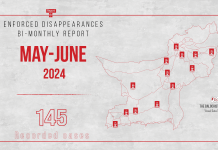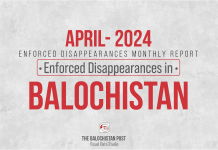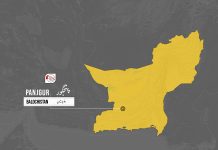Author: Dr Aroosa Fatima
Balochistan issues have never remained out of debate, but flood-devastation has once again put the desolated state of the province into limelight. Pakistan which has recently turned 75-years, has faced East Pakistan tragedy, constitutional crisis, repeated military interventions, increased extremism, economic disaster and terrorism, since inception till yet. Despite all these problems, countless encouraging developments have also been enjoyed by Pakistan, as it has traveled from feudalism to technocracy, from centralized to decentralized system, from militarily weak state to strategically more stable status and from patriarchy to somewhat women empowerment.
However, the fate of Balochistan province has not changed, and the province is still characterized by extensive underdevelopment, militancy that is also called political resistance, and extreme poverty. Several regional and international factors and events have contributed to this state of despair of Balochistan. Internally, the primary factors to which socio-economic development of Balochistan has remained hostage are: political instability, low level of education, unemployment, non-existent women’s participation, unequal representation in national power structure, unequal distribution of resources, ineffective management of natural resources and natural calamities. Whereas, foreign involvement and feudalism comes as secondary factors, as foreign involvement cannot be effective without getting support from underprivileged and rights-deprived locals; and as far as feudalism factor is concerned, there is no Sardari system in underdeveloped Kharan and Makran regions. So, the socio-economic issues of Balochistan have remained unsolved largely due to administrative failures both at federal and provincial levels.
Balochistan province is territorially the largest; resource wise the richest; population wise the smallest, in the terms of development poorest and among other provinces of Pakistan the most unprivileged. According to an estimate Balochistan alone carries more than eighty minerals that are worth 50 trillion USD, but still the people of province are forced to live under constant despair. Here are some reasons that make resource rich Balochistan most underdeveloped province.
Natural resources of Balochistan are being used by state, but no notable investment has ever been made for the socio-economic development of Balochistan. 70 percent gas is provided by Balochistan to other provinces and for producing energy without actually getting its due share out of the revenue that federal government makes through gas and electricity companies. Other minerals are also being extracted by international companies as Pakistan lacks in technology. In this regard, CPEC project is seen as the game changer for Pakistan and development of Balochistan, but the focus of development is one zone of the province till yet. So, practically, these developments do not hold any meaning for people of Balochistan until these resources do not fulfill the needs of its natives first. Failure to utilize resources and minerals for creating career opportunities and economic growth for the people of Balochistan is not just the matter of mismanagement by bureaucracy and federal-provincial governments, rather these are the corruption stories like Diko Deq that shadow the development process in Balochistan.
Poverty is more than evident in the province. According to the different surveys and statistics, Balochistan stands highest with more than 40% in the poverty rate among all provinces of Pakistan. Low literacy rate, unemployment and water drought are contributing to the poverty in Balochistan. Although the state of education in all provinces of Pakistan is not noteworthy but in Balochistan, it is considered worse. Only 13 thousand schools are functioning to facilitate almost 13 million children between the age of 5-16 in province. As if the number of schools are not enough to alarm, most of these schools are working without teachers, roofs and basic facilities. It is easy to list the number of factors responsible for the delicate state of education, but hard to deal with the concerning issues like unemployment, poverty and militancy, that are rising due to this factor. Time to time, both federal and provincial governments have taken measures to improve education sector, but simply the efforts are not enough. Education emergency is required to be imposed with immediate concern.
Four percent unemployment rate in province is emancipating from low education, insufficient job opportunities at provincial and federal level and absence of private sector that can create jobs for locals. The unemployed and rural population of province heavily relies on the agriculture for their livelihood, but unfortunately water shortage is stripping off that means of earning as well. Water resource management is another imminent issue of Balochistan. Naturally, its arid and water drought province. The available water is consumed by the existing industries without paying any dues, whereas locals and animals use the remaining water, that also shows there are no proper healthcare facilities are being provided to Balochistan.
Security and human rights issues are also present in Balochistan in the shape of insurgency, Hazara genocide and missing person issue. Hazara genocide and Baloch ethnic insurgency are active since last two decades. However, both issues cannot be solely linked to foreign involvement. Poverty and unemployment are also the psychological sources behind extremism and militancy in province, whereas, missing persons issue and militancy are linked proportionally. The Balochitsan, that is often blamed for the politics of ethnicity, which is consisting of two large populations, Baloch and Pashtuns, have never displayed any hatred towards each other. Hence, the grievances are limited towards the federation. Although, there is no silver bullet for the problems facing by Balochistan, but a few measures should be taken in order to gradually resolve the state of despair.
1. Greater level of integration is needed at national level, but integration process depends on level of inclusion, equal opportunities and right to services to which people of Balochistan may provide with.
2. The development of entire Balochistan should be done on the principle of priority to the locals, as it is practiced in other provinces. Due rights of the owners of lands should not be denied because Gwadar, Sui, Sendak, Reko Dek and the sea coast are the birthright of the local people.
3. Establishing the private industries with the help of countries and provinces harboring economic interests in the region can help to create job opportunities for locals, and already functioning companies besides these industries should be bound by federation to hire locals instead of hiring nonresidents.
4. Border trade through Chamman and Taftan borders are among the major income sources of the province. Allowing protected movement of labor, capital, goods, and services within these trade outlets can improve the incomes.
5. Lifting ban on Iranian oil can also provide cheap oil to Pakistan, but borders should be monitored strictly to prevent smuggling.
6. Immigrants from neighboring countries should be sent back with immediate effect and implement policies to bar illegal immigrants without passport and visas.
7. Right of Balochistan over the projects like Sindek, Reko Dek and Gawadar must be accepted and its share in the revenue that federation makes from extracting different minerals must be accordingly.
8. Free and fair provincial elections must be ensured that may elect the true voices of province.
9. Increased financial support for social services and infrastructural development including transport links and communication technology can raise the living standards.
10. Balochistan is the state of people of Balochistan, therefore cooperation of natives is required in to improve the law and order and overall security situation of the province. Extremism can be countered by addressing the major grievances relevant to education and jobs.






























